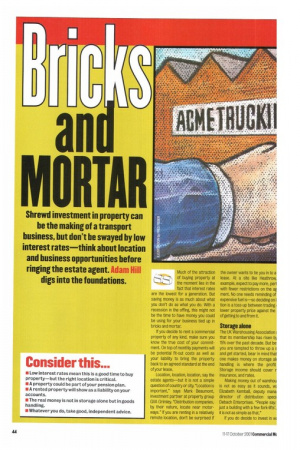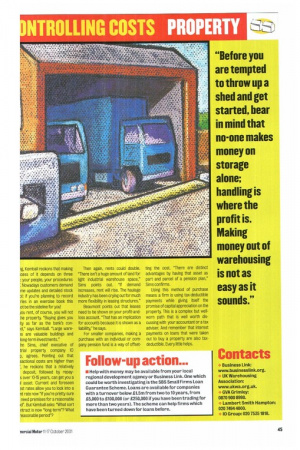10—Pan
Page 44

Page 45

If you've noticed an error in this article please click here to report it so we can fix it.
MORTAR
Shrewd investment in property can be the making of a transport business, but don't be swayed by low interest rates—think about location and business opportunities before ringing the estate agent. Adam Hill digs into the foundations.
Much of the attraction
—7 of buying property at
the moment lies in the
fact that interest rates are the lowest for a generation. But saving money is as much about what you don't do as what you do. With a recession in the offing, this might not be the time to have money you could be using for your business tied up in bricks and mortar.
If you decide to rent a commercial property of any kind, make sure you know the true cost of your commitment. On top of monthly payments will be potential fit-out costs as well as your liability to bring the property back to an agreed standard at the end of your lease.
Location, location, location, say the estate agents—but it is not a simple question of country or city. "Location is important," says Mark Beaumont, investment partner at property group OVA Grimley. "Distribution companies, by their nature, locate near motorways." If you are renting in a relatively remote location, don't be surprised if
the owner wants to tie you in to a lease. At a site like Heathrow, example, expect to pay more, perl with fewer restrictions on the ag ment. No one needs reminding of expensive fuel is—so deciding on I tion is a toss-up between trading lower property price against the of getting to and from it.
Storage alone
The UK Warehousing Association that its membership has risen t) 15% over the past decade. But be you are tempted to throw up a E and get started, bear in mind that one makes money on storage e handling is where the profit Storage income should cover r insurance, and rates.
Making money out of warehou is not as easy as it sounds, WE Elizabeth Kemball, deputy mana director of distribution speci Debach Enterprises. "People say: just a building with a few fork-lifts', it is not as simple as that."
If you do decide to invest in \
Kemball reckons that making cess of it depends on three your people, your procedures Nowadays customers demand Tie updates and detailed stock II: if you're planning to record les in an exercise book this )t be the sideline for you
ou rent, of course, you will not he property. "Buying gives you i .y as far as the bank's con 1," says Kemball. "Large ware;5 are valuable buildings and long-term investments."
hn Sims, chief executive of Hal property company 10 p, agrees. Pointing out that sactional costs are higher than , he reckons that a relatively deposit, followed by repays over 10-15 years, can get you a II asset. Current and foreseen 3 it rates allow you to lock into a n1 rate now "if you're pretty sure need premises for a reasonable id". But Kemball asks: "What sort .ntract is now "long-term"? What reasonable period"?
Then again, rents could double. "There isn't a huge amount of land for light industrial warehouse space," Sims points out. "If demand increases, rent will rise. The haulage industry has been crying out for much more flexibility in leasing structures."
Beaumont points out that leases need to be shown on your profit-andloss account. "That has an implication for accounts because it is shown as a liabililty," he says.
For smaller companies, making a purchase with an individual or company pension fund is a way of offset ting the cost. "There are distinct advantages by having that asset as part and parcel of a pension plan," Sims confirms.
Using this method of purchase means a firm is using tax-deductible payments while giving itself the promise of capital appreciation on the property. This is a complex but wellworn path that is well worth discussing with your accountant or a tax adviser. And remember that interest payments on loans that were taken out to buy a property are also taxdeductible. Every little helps.








































































































































